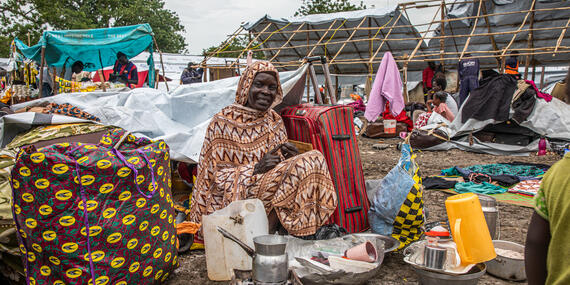Today's top news: Sudan, Ukraine, Libya

Sudan
The Humanitarian Coordinator for Sudan, Clementine Nkweta-Salami spoke to reporters earlier today in Geneva, warning that the country’s population is balancing on a knife’s edge as Sudan is gradually consumed by the ongoing conflict.
With some 5.4 million having fled their homes, Sudan has become the fastest-growing displacement crisis in the world. Half of the country’s population – 24.7 million people – now requires humanitarian aid.
Ms. Nkweta-Salami said that the UN continues to receive reports of increasing cases of sexual and gender-based violence, enforced disappearance, arbitrary detention and grave violations of human and children’s rights.
She also warned that the conflict could reach areas like Jazirah State, the country’s breadbasket, and this would have grave consequences for food security.
On the health front, 70 per cent of all hospitals are no longer functioning. She expressed concerns about battling cholera outbreaks in war zone, as the current heavy rains and floods could lead to more outbreaks of water-borne diseases.
The UN and our partners have reached at least 3.6 million people working with and through Sudanese humanitarian workers, civil society organizations, non-governmental organizations.
The US$2.6 billion Humanitarian Response Plan for Sudan is currently 32.8 percent funded.
Still on Sudan, Ms. Nkweta-Salami today condemned in a separate statement a deadly attack on a displaced camp hosting 50,000 people in Central Darfur.
On 26 September, six people were killed and some 2,300 people lost their homes after their shelters were burned during clashes between the Sudanese Armed Forces and Rapid Support Forces near Hasahisa camp.
Ukraine
The Humanitarian Coordinator in the country, Denise Brown, today condemned an attack that caused significant damage to the village of Hroza, in the Kharkiv Region. Dozens of civilians were killed in that attack which took place in the middle of the afternoon.
In her statement, Denise Brown called the images arriving from the locality, which is home to just over 300 people, absolutely horrifying.
Ms. Brown sent condolences to the bereaved families and to the people of Ukraine and stressed that international humanitarian law must be respected.
Our colleagues tell us that humanitarian workers in the country are mobilizing assistance to civilians harmed by this attack.
Libya
The survivors of the catastrophic flooding in the northeast of the country urgently need shelter, protection, health care – including mental health care – and water, sanitation and hygiene supplies.
That’s according to a new assessment that was carried out in areas affected by Storm Daniel.
Buildings were severely damaged by the floods in more than a third of the locations assessed by an inter-agency team of more than 10 partners. Some 42,000 people are still displaced, according to the International Organization for Migration. Many need cash to cover rent and support shelter repairs. Though water supplies are available, they are not always safe or affordable.
Nearly two-thirds of health facilities are either out of service or only partially functioning, according to the World Health Organization, with more than 100 health workers killed due to the floods.
Meanwhile, UNICEF says nearly 100 damaged schools remain closed.
We and our partners have reached more than 125,000 people with relief items and protection services in flood-affected areas.
But to continue these efforts, we need reliable funding. To date, our Flash Appeal for more than $70 million to help flood survivors is less than one-third funded.
